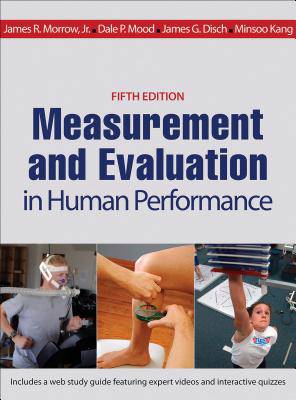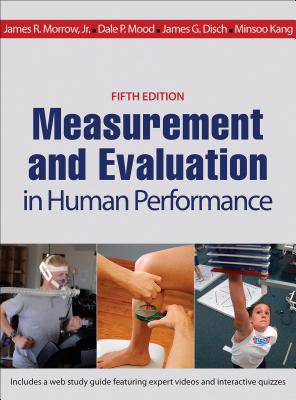
- Retrait gratuit dans votre magasin Club
- 7.000.000 titres dans notre catalogue
- Payer en toute sécurité
- Toujours un magasin près de chez vous
- Retrait gratuit dans votre magasin Club
- 7.000.0000 titres dans notre catalogue
- Payer en toute sécurité
- Toujours un magasin près de chez vous
Measurement and Evaluation in Human Performance
James R Morrow, Dale P Mood, James G Disch, Minsoo KangDescription
Measurement and Evaluation in Human Performance, Fifth Edition With Web Study Guide, leads students through the fundamentals of collecting and analyzing data of human performance and applying their results to real-life situations. Focusing on the core concepts of reliability and validity of data, the text provides all the necessary tools for evidence-based decision making that can be applied to physical therapy, allied health professions, kinesiology, sport and exercise science, physical education, health, and fitness.
The fifth edition of Measurement and Evaluation in Human Performance provides students with a logical progression of information in a straightforward manner. Introductory algebraic concepts are combined with the technological capabilities of Microsoft Excel and IBM's Statistical Package for the Social Sciences (SPSS) to aid students in calculations and data analysis. The text expands on previous editions and includes the following enhancements:
- Additional sport-specific and exercise examples, as well as physical education examples focusing on motor skill abilities and psychological skills, that provide real-world application of the material
- Updated examples for use and practice with Excel and SPSS calculations and techniques that illustrate data analyses
- Expanded emphasis on evidence-based decision making to guide students in making appropriate decisions
- 52 video interviews of top researchers who offer greater insight into the field as students work through the text
The text is divided into four easy-to-follow parts. Part I introduces the concepts of measurement and evaluation and their importance to decision making in human performance with specific attention to applications of measurement, testing, and evaluation. Part II explores statistics as core tools and resources for these evaluations and decisions and explains the various forms of statistical procedures often used in measurement. Part III takes the skills gained from parts I and II and extends them into applied issues in human performance, such as evaluating a person's aerobic capacity or muscular strength. The importance of reliability and validity in data is also covered in detail. Part IV provides information on practical applications that apply all of the information from the previous sections.
Learning aids for this text, including a robust and newly updated web study guide with activities and questions for active learning and engagement, enhance student comprehension and retention. Chapter objectives highlight main points that students should focus on throughout the chapters, and key terms are highlighted and defined in the glossary. Mastery Items include problems and activities that test student knowledge, while Measurement and Evaluation Challenge sidebars provide scenarios that can be tackled with the information gathered throughout the chapter. Additional data sets for each chapter are also provided in the web study guide for practice and mastery of techniques in Excel and SPSS. To aid instructors, Measurement and Evaluation in Human Performance, Fifth Edition, includes a suite of ancillary materials: instructor guide, presentation package plus image bank, test package, chapter quizzes, and instructor videos.
Measurement and Evaluation in Human Performance, Fifth Edition, continues to providee students with the tools and confidence they will need to gather reliable data, analyze it, and apply it in their work with clients. With its emphasis on understanding and applying sound measurement techniques, this fifth edition prepares students and professionals to identify problems and make solid decisions in the realm of human performance.
Spécifications
Parties prenantes
- Auteur(s) :
- Editeur:
Contenu
- Nombre de pages :
- 480
- Langue:
- Anglais
Caractéristiques
- EAN:
- 9781450470438
- Date de parution :
- 19-10-15
- Format:
- Livre relié
- Format numérique:
- Genaaid
- Dimensions :
- 216 mm x 279 mm
- Poids :
- 1360 g

Les avis
Nous publions uniquement les avis qui respectent les conditions requises. Consultez nos conditions pour les avis.






